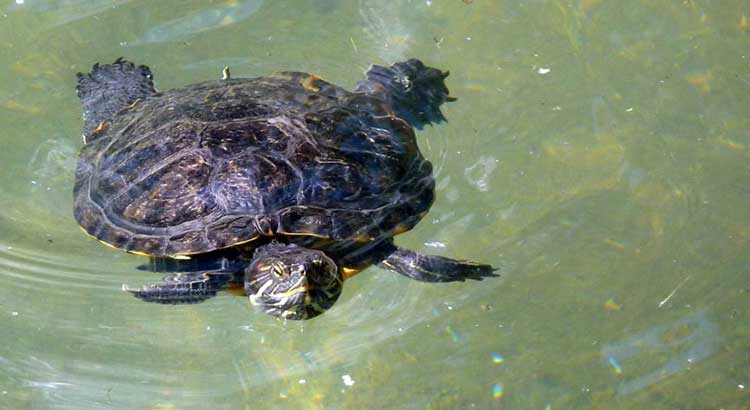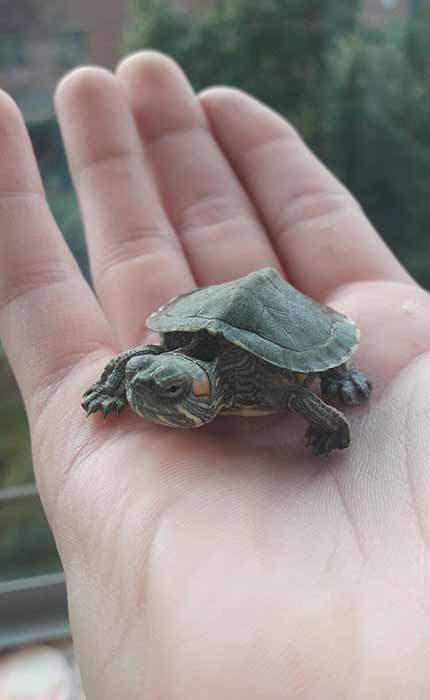Turtles spend most of their time in water, so it’s important to make sure that they have the right type of water in their tank. But what exactly does that mean? Do you need to use bottled water? Is tap water good enough? Let’s find out.
Turtles need water that is free of chlorine and ammonia and other impurities. And the pH needs to be neutral. The source of the water is not important as long as it’s clean and safe.
As long as the water is safe for turtles it doesn’t matter if it’s spring water or it came from the sink. In general bottled water has all the qualities that you want for a turtle tank, but it can be very expensive. So I would recommend you to use tap water, and if needed apply some water treatments to adjust it.
Tap Water
Tap water is not necessarily a type of water, it’s the water that comes out of your sink. But where that water originates and how it’s treated can differ greatly from region to region. So the answer to the question: can turtles live in tap water? Can be yes for one person and no for another person. The only certain way to know for sure is to test it, and fortunately there are a few ways to do this, and one of them is completely free.
Most countries in the world have a specific agency that tests and provides information on the water in multiple areas. So you can google the agency in your country that does this and you should be able to find some information about the water in your area.
The problem with this is that they usually choose an area and test it there, but there can be big differences between the water in the testing point and the water that reaches your home. It’s even possible that your house has a rusted pipe which can make your water different from the water your neighbor receives. So while this is a good way to get a general idea about your water, it’s not the most precise.
Another way to test your water is to buy a water testing kit. They are quite cheap and they are really easy to use. Here is a link to a testing kit that I’ve used before: API MASTER TEST KITS for Freshwater, Saltwater, Reef Aquariums and Pond.
The final and most professional way of doing it is to take a sample of your water and take it to a water testing lab. In this case I can’t make any recommendations since I never used this kind of testing method.
Now let’s see what you want to have in your turtle’s water, and what you want to avoid..
The Kind of Water Turtles Need
First thing that you should know is that every turtle species will have different requirements. The ones that I am going to give you are good for most species, but if you have a slightly more exotic species you might want to do some research for that specific species.
So here are the water levels that you should aim for:
- A pH between 6.0 and 8
- A chlorine level of 0
- An ammonia level of 0
- A nitrite level of 0.5 ppm (parts per million) or less (preferably zero)
- A nitrate level of 40 ppm or less
Another good and simple way to get more exact levels for your turtle is to ask at the pet shop where you bought it. But the values mentioned above should work for 90% of pet turtles.
Now let’s see how we can make the water that comes from your sink perfect for your turtle.
How to Make Tap Water Perfect for Turtles
Technically speaking any water in the world can become perfect for your turtle, all you need to do is to use some water treatment.
There are different water treatments out there, some are good, some are bad. I’m not going to focus on the bad ones but I will tell you to avoid all in one treatments, they are usually not as efficient as individual treatments, and they might end up making the water worse. And in most cases tap water is safe, it just needs a little adjustment.
As for which to use, for the past few years, I’ve been using API products, to lower the chlorine levels in my water, and the results have been great, so I would recommend you to check out their Amazon Store Page if you need any treatment for your water, there you will find chlorine treatments, pH treatments, and many more.
Having the correct type of water is great, but there is one more thing that you need to look at, and that is temperature.
The Correct Turtle Tank Water Temperature
Despite their rough-looking exterior, turtles are very sensitive to their environment, and one of the most important aspects is the temperature of the tank. If the water is too hot or too cold it can lead to health problems, so it’s important to get the right temperature for the tank.
On average the temperature of a turtle tank should be between 72 and 77°F (22 to 25°C).
But, this is just the average, and while this will work for most turtles, you should know that each turtle species has slightly different temperature requirements. Here is a table with the specific temperatures required by some of the most popular pet turtle species.
| Turtle Species | Temperature Range |
| Red-Eared Slider | 72°F – 76°F (22°C – 24°C) |
| Yellow-Bellied Slider | 75°F – 80°F (24°C – 27°C) |
| Mud Turtle | 74°F – 78°F (23°C – 26°C) |
| Spotted Turtle | 75°F – 80°F (24°C – 27°C) |
| Map Turtle | 70°F – 75°F (21°C – 24°C) |
| Diamondback Terrapin | 75°F – 82°F (24°C – 28°C) |
| Painted Turtle | 75°F – 80°F (24°C – 27°C) |
| Pond slider | 78°F – 82°F (26°C – 28°C) |
| Musk Turtle | 74°F – 82°F (23°C – 28°C) |
| River Cooter | 72°F – 77°F (22°C – 25°C) |
Now that we know what is the correct temperature for turtle tanks, let’s see how we can get that temperature.
To be able to control the temperature of the water in the tank you are going to need a water heater, but not any water heater will do. You need a water heater that:
- Has a heat guard – so that your turtle won’t get too close and burn itself
- Is sturdy – turtles tend to break things in their tank, so you need a heater that won’t break easily
- Adjustable temperature – not all heaters are adjustable, so make sure that you get one that is
- Has enough power – turtles need big tanks, and not all heaters are able to heat a turtle tank, as most of them are designed for smaller fish tanks.
If you want a recommendation, here is a link to the tank heater that I’ve been using for the last 5 years: Submersible Aquarium Heater. I don’t have too many things to say about it, it’s a good and reliable heater, it comes with a guard, and you can easily select the temperature, it can heat up a 100-gallon tank, so everything that you want from a heater.
One more thing that I would like to take a look at before closing the article is the water filter.
The Water Filter
The purpose of the water filter is to keep the water clean. And having a good water filter means that you won’t have to change the water as often, and that your turtle will live in a healthy and clean environment.
Turtles are really messy and can make a clear watered thanks into a cloudy mess in just a couple of days. To prevent this from happening you need a water filter.
A good water filter will be able to keep your tank clean for days, even weeks. But a bad water filter won’t be able to keep up with your turtle and in just a couple of days, the tank will be a complete mess.
And surprisingly enough, most people choose to buy the wrong water filter for their tanks. And when I say wrong I don’t mean the wrong model or the wrong brand, no. The problem is that those filters don’t have enough power.
Filters are rated based on how much water they can cycle, so we have 20-gallon water filters and 60-gallon water filters. The problem is that most of those filters are rated for fish tanks, not for turtle tanks. And the amount of mess a fish mess doesn’t even compare to the mess a turtle makes.
For a turtle tank, you should get double the power that the tank needs. So if you have a 40 gallons tank you should get a filter that is rated for 80 gallons, not for 40. If you have a 60 gallons tank then you should get a 120 gallons water filter, not 60.
You can always go higher, this will only keep the tank clean for longer. But going lower will usually mean that you will have to clean the tank a lot more often, and the water will start to smell bad really soon.
You can also find my recommendations for the best water filter on the Recommended Gear page.
Final Thoughts
As I said in the beginning, it doesn’t really matter where the water comes as long as it’s clean and safe.
The most efficient way to make sure that the water is safe, is to get a pack of water testing strips and use them every time you change the water, and adjust the water accordingly. Most water treatments cost under 10$ and can last you anywhere between 6 months and a year, depending on how often you change the water.
And speaking of changing the water, I can’t stress enough how important it is to have a good water filter. If you have one that is powerful enough you will have to change the water less often. So you will have to use less water treating solutions, and have a smaller water bill.
After you are done checking the water make sure to also have a look at the temperature, an improper temperature can easily affect the health of your turtle, and can make it easier for algae to grow, and in some cases, due to the food particles in the water, make the tank stink.
I hope this article answers all of your questions about turtles and what kind of water they live in, but in case there is anything else that you would like to know, don’t hesitate to leave a question in the comment section below. I regularly check for questions and answer each and every one of them.


